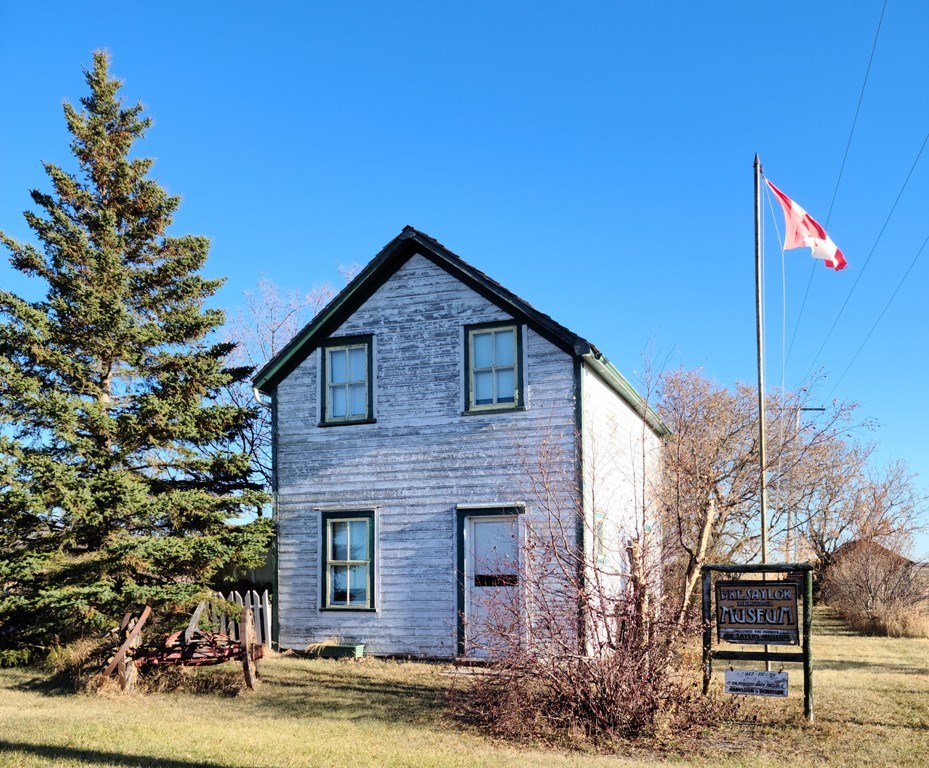Many life experiences from the Bresaylor settlers were passed down over the years. Joe and Mary Rose Sayers had numerous stories to tell from both sides of the family.
Mary Rose’s father, John Pritchard, was born in the Red River settlement in 1840. He was well educated and spent years working for the Hudson’s Bay Company. In the early 1880s he left his employment with the company and by 1884 the Indian Department had hired him to work as an interpreter at Frog Lake under the supervision of Thomas Quinn, the Indian agent. John spoke English, French, Gaelic, Cree and possibly other languages.
On April 2, 1885, Wandering Spirit shot Thomas Quinn in front of the Pritchard home and proceeded toward their house with the probable intention of shooting Johnas well. John was away at the time and his wife Rose, who was half Cree, met Wandering Spirit at the door. She wouldn’t let him in, but gave him a tongue-lashing in Cree and told him he had done enough mischief for the day.
Wandering Spirit then left, heading toward the Catholic Church. John came back to the house and when Wandering Spirit returned to the Pritchard home, the door was barred shut. Cooler heads prevailed or perhaps it was the fear of Rose’s wrath if John was shot that John and his family were spared. They were taken prisoner and their house burned.
John traded two horses and $30 for Mrs. Delaney and Mrs. Gowanlock, the two white women whose husbands had been killed. This meant that the women lived with his family and were under his protection.
Mary Rose, the Pritchard’s oldest daughter, was 11 years old when the family became prisoners in Big Bear’s camp. She would have witnessed the massacre, watched the family’s house burn and faced being taken prisoner. Mary Rose would have been at the siege of Fort Pitt when other prisoners joined her family. Other events she would have lived through included helping dig a rifle pit just off the front line at the Battle of Frenchman Butte, where rifle shells and canon fire were shot in battle, then crossing the waist-deep muskeg at Steele Narrows as they were being shot at by Steele’s men. The prisoners were released near Goodsoil and left to make their way back south. All became memories for this 11-year-old girl.
After the North-West Rebellion, the Pritchard family were witnesses at the trials in Battleford and Regina. Like the Bresaylor settlers who had been prisoners in Poundmaker’s camp, John Pritchard received no compensation from the government for his losses. The Pritchard family then moved to the Bresaylor settlement and homesteaded there.
Mary Rose later married Joseph (Joe) Sayers. At the age of 13, Joe had arrived at the Bresaylor settlement with his parents in 1882. As a young man he had been one of the prisoners at Poundmaker’s camp during the North West Rebellion.
Joe and Mary Rose farmed in the Bresaylor settlement and were an integral part of the community. They lived long enough to celebrate their 76th wedding anniversary. Joe died in 1966 and Mary Rose in 1970.
Their eldest son, Joseph Alexander Jr., after retiring, started the Bresaylor museum where he kept many historic items that had belonged to his parents and other Bresaylor settlers, envisioning a collection for us and future generations to enjoy.
Check out the Bresaylor Heritage Museum Facebook page for more information. The museum is open by appointment only from June 9 to August 31. Please phone 306-895-4813.




